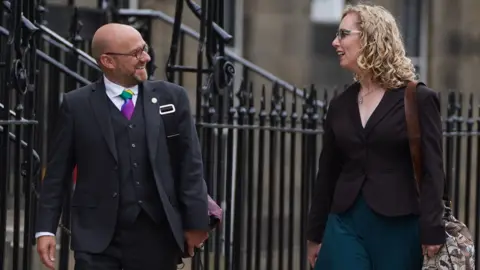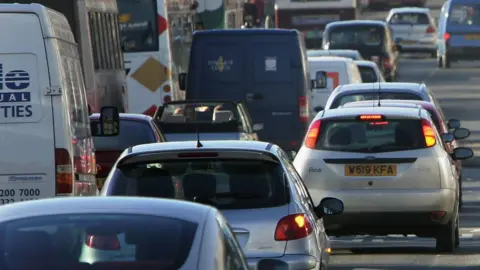Scottish Greens co-leaders Harvie and Slater to be given minister roles
 PA Media
PA MediaThe Scottish Green Party has confirmed that its co-leaders will become ministers if its deal with the Scottish government is approved.
On Saturday party members are due to vote on the agreement, which would take Greens into national government for the first time anywhere in the UK.
If approved, Patrick Harvie and Lorna Slater will be given minister roles.
The power-sharing agreement between the pro-independence Scottish Greens and the SNP was announced last week.
It is understood the two Green ministers would have responsibility for areas of environmental and social justice policy and would work across several different departments.
The co-leaders could expect to earn an extra £30,000 a year each on top of their MSP salaries.
While they would not serve in the Scottish Cabinet, they might be invited to attend from time to time.
Mr Harvie and Ms Slater's appointments are expected to be made next week by First Minister Nicola Sturgeon.
The new ministers would be additions to the government so SNP ministers would not lose their jobs to make way for them.


Greens say going into government for the first time is about maximising their influence, getting as much of their manifesto delivered as possible.
They know that does not come cost free. Some of their principles will come under pressure like never before.
If this deal is approved, Patrick Harvie and Lorna Slater will become part of a government that remains committed to building new roads and has not set a date for ending oil and gas extraction.
But if the deal is rejected, Greens may lose the chance to shift more transport spending towards rail and cycling, set rent controls in social housing and expand renewable energy production.
Party members have to decide if the deal includes enough Green clout to offset the compromises that come with sharing power.
The party's co-leaders stress their flexibility to criticise the SNP in policy areas outside their agreement but they may also be obliged to defend government decisions they do not like.

Following her party's confirmation of the ministerial proposals, Lorna Slater said it was time for Scotland "to step up efforts to decarbonise our economy and invest in a greener, independent future".
She added: "The co-operation agreement we've negotiated would put Greens at the heart of decision-making at this crucial time and if our members endorse it then I look forward to driving change in government."
Patrick Harvie said if party members backed the plan, "they can be assured that we'll waste no time getting to work to deliver on their transformative agenda".
He said: "With Greens in government we would be able to deliver positive change like tackling Scotland's emissions, protecting nature, advancing tenants' rights, bringing forward overdue equalities legislation and delivering an independence referendum."
 Getty Images
Getty ImagesThe Scottish Conservatives' Covid recovery spokesman Murdo Fraser accused Nicola Sturgeon of looking to appoint "extremists" who "don't believe in economic growth...and who actively want to limit Scotland's economy".
He said: "Neither Patrick Harvie or Lorna Slater should be anywhere near key financial decisions that will impact jobs and businesses.
"Their growing influence is a danger to our oil and gas industry and the 100,000 jobs it supports. The Greens seek to undermine the future of the North Sea sector at every turn, and Nicola Sturgeon is giving them a bigger platform to do that."
The Greens have signed up to the bulk of the government's policy - but there will also be areas where they are in disagreement with the SNP, and they will be able to criticise it on those points.
These excluded areas include aviation policy, international relations, policy on fee-paying schools, fox hunting and Nato membership if Scotland becomes independent.
The co-operation agreement says the two parties will work together to provide "effective and responsible leadership for Scotland for this session of the Scottish Parliament, in the interests of Scotland, of the people who live in Scotland, and of future generations".
It says they will secure a referendum on Scottish independence "within the current parliamentary session on a specific date to be determined by the Scottish Parliament".
They have also committed to holding a referendum on Scottish independence within the next five years, and preferably by the end of 2023.
